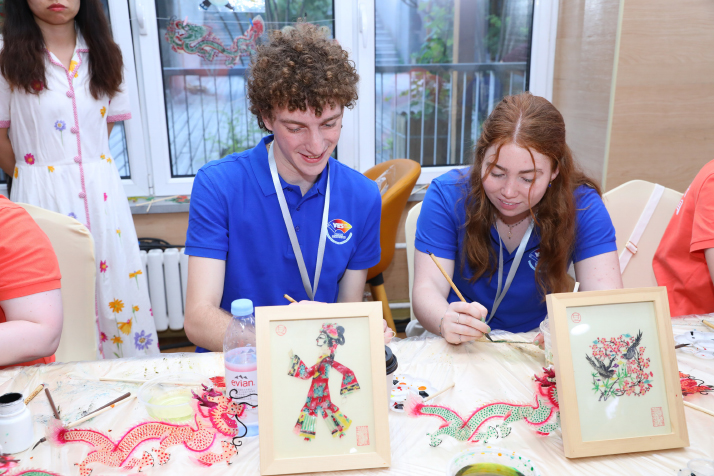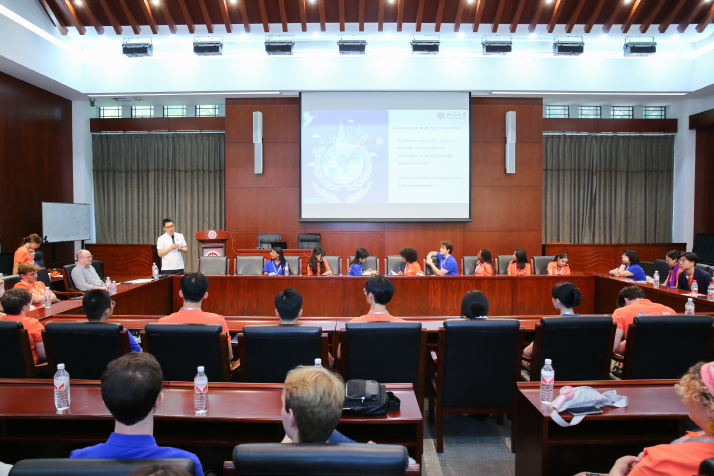
As the rainy season begins in Beijing, Rocío Colón’s study in the city is coming to an end. The U.S. college student, from San Juan, Puerto Rico, arrived in China for the first time on June 21 for a two-month standard Chinese language course under a collaborative program between Princeton University and Beijing Normal University.
“It’s been a great experience so far, even though two months is a very short time,” she told Beijing Review.
“Why Chinese?” This is a question that many people have asked her, especially back in her hometown, where not many people speak the language. “I was drawn to Chinese calligraphy and I found the characters to be beautiful. Additionally, the language is unlike Spanish and English, which I had studied before,” she explained, adding that its uniqueness captured her attention.
Colón found that there weren’t many people in the U.S. studying Chinese, but the U.S. Government is making efforts to encourage more people to learn about China and its language.
“I began learning Chinese online through a government program during the COVID-19 pandemic,” she said, adding that she believes language learning is beneficial for fostering better relations between the two countries.

A new experience
Colón, majoring in art history and Chinese at university, had been trying to participate in a language program in China. After five years of waiting, she finally got the opportunity.
“I wanted to learn the language in the country where it originates. I believe that’s the most effective way to engage with the language because I can speak to Chinese people and use it on a daily basis,” she explained. Colón said she was also excited to be able to explore the city and its culture, and get to know local people.
Since Colón hadn’t heard much about life in Beijing, she didn’t know much about the city except that it boasts a long history and has traditional Chinese architecture. She initially thought it would be more like Shanghai with skyscrapers and modern buildings but was pleasantly surprised by its very different atmosphere.
“I like it very much. I love the ease of public transportation, and it is very convenient to go anywhere in the city. I appreciate the people here in Beijing. I think they are great and very helpful most of the time.”
Each day, Colón and her classmates have five hours of Chinese class and learn a new lesson that includes about 80 vocabulary words. They have been delving into more challenging topics such as left-behind children in China’s rural areas and Western influence on China. They also explore famous Chinese stories and essays as part of their courses.
Colón believes that the most fascinating book so far has been The Temple of Earth and Me by Shi Tiesheng, one of the most prominent Chinese writers of the second half of the 20th century. In the book, the disabled writer beautifully expresses his profound thoughts depicting a journey of seeking hope in desperate times and longing for his mother.
“I can feel that my Chinese has improved a lot since coming here,” Colón said. She is confident that learning Chinese will benefit her future career as she hopes to conduct research related to Chinese art as a museum professional.
A youth dialogue
Colón has also had the opportunity to visit Shanghai and Datong, a city in Shanxi Province with a history of over 2,000 years. She expressed her fascination with the diverse range of places in China that many U.S. students may not have experienced before, and her desire to learn more about people in different parts of China.
Colón also participated in an event for young people from the U.S. and China at Peking University on July 18. The event, the U.S.-China Youth Leaders Dialogue, was co-hosted by the university and the China Education Association for International Exchange, and brought together over 200 students from nearly 50 Chinese and American universities, including prestigious institutions such as Harvard University, Princeton University, University of Chicago, Peking University and Tsinghua University.
During the gathering, students from both countries shared their experiences of traveling and studying. They also exchanged views on global issues such as youth exchange for enhanced understanding, climate change and green development, as well as technological innovation.
Colón was a participant in the forum on culture exchange. “I think we should share more diverse stories about the U.S. with China. For example, I’m from Puerto Rico but am also an American citizen. The U.S. is more than just what is shown in movies and TV shows,” she said.
She also believes that it would be beneficial for U.S. students to share their experiences while in China so that more people can see the beauty of the country.
“Everything the American students see, hear and taste in person throughout the journey might make them realize that China is different from how it is presented in some books, classes or media,” said Chen Jie, Vice Minister of Education, at the event.
The event also featured the release of a joint initiative by the Chinese and American youth that promotes the importance of people-to-people and cultural exchanges, as well as advocates for sustainable green development. It also encourages young people from both countries to participate in scientific and technological innovation for a brighter future for all humanity.
“In an era filled with uncertainties, it is crucial for the younger generations of the two countries to work together toward finding solutions. The friendship between Chinese and American youth serves as a vital foundation for building trust and fostering cooperation between our two countries,” Chen noted. –The Daily Mail-Beijing Review news exchange item




